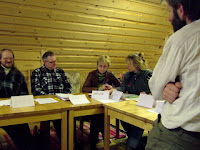
I was invited to Estonia recently. My mate Marny is a tutor in European Rural Tourism at nearby Radstock College and she asked me along to do a workshop with a local food network in South Eastern Estonia. Near the Russian border. A place called Voru. Once you’ve found Estonia on a map, and then find Voru, you discover it’s actually nearer to Riga in Latvia than to Tallinn, the capital of Estonia. And you can now fly direct to Riga from Bristol Airport. So off we went.
As we drove towards Voru through the flat birch wood countryside the snow started to fall, lightly at first and then more thickly. By the time we reached our destination it was a foot deep. In Estonia they don’t grit the roads, or sweep the snow from them. The cars just have snow tyres with studs in them. For some reason our car didn’t have snow tyres and we tobogganed our way down the country roads at the end of the journey.
 The workshops were held in a log cabin, well equipped technically and cosy – they do know how to do cold. It perched above a freezing lake, the ice growing as we watched. We had about sixteen participants, all involved in local tourism and interested in food.
The workshops were held in a log cabin, well equipped technically and cosy – they do know how to do cold. It perched above a freezing lake, the ice growing as we watched. We had about sixteen participants, all involved in local tourism and interested in food.
It’s hard to know what to tell such people. In this part of the world we are all eschewing processed foods and buying locally. Even, heaven forbid, actually growing some of our own vegetables. Local food festivals are multiplying, there are farm shops everywhere, and each town has its own farmers’ market. But isn’t that what they have been doing for centuries in Estonia?
Well, no, surprisingly. Which is when you realise what being under the heel of the Russians, then the Nazis, then the Soviets does to the character of a nation. Estonia was a sovereign country for only a couple of decades in the early part of the twentieth century. For the rest of the time, until 1991, it was part of somebody else’s hegemony. So, apart from the regional costumes and the national pastime of choral singing they have hardly any traditions left.
 We ate good black bread, made locally from rye, and sometimes it had raisins in it. Main courses were invariably pork and potatoes. The local supermarkets were well stocked, with oranges from Spain and the usual range of vegetables. I liked the vodka a lot, also made from rye. It was smooth and faintly fruity. Local beers included one with honey. The wine was called Old Tbilisi and it was recommended but I gave it a miss!
We ate good black bread, made locally from rye, and sometimes it had raisins in it. Main courses were invariably pork and potatoes. The local supermarkets were well stocked, with oranges from Spain and the usual range of vegetables. I liked the vodka a lot, also made from rye. It was smooth and faintly fruity. Local beers included one with honey. The wine was called Old Tbilisi and it was recommended but I gave it a miss!
We took with us the pride of Somerset – West Country Farmhouse Cheddar from Westcombe Dairy – see previous post. We also took some chutney, Real Ale chutney. Some translating problems with the words Real Ale, never mind chutney. It’s amazing what you take for granted about your own culture.
In return they gave us goats’ cheese, a multiplicity of grains including spelt, and some wonderful berry products, juiced and dried, from the virgin woods and forests of Estonia. Had it not been for the whiteout we would have foraged further.
As the bargain airlines fly planeloads of hen and stag parties ever further into foreign territory, places like Voru – quiet oases of peace and solitude – will have their chance to bid for tourists who don’t want to party all night. I’m just not quite sure how you tell the difference between all these new arrivals on our eastern horizons.






